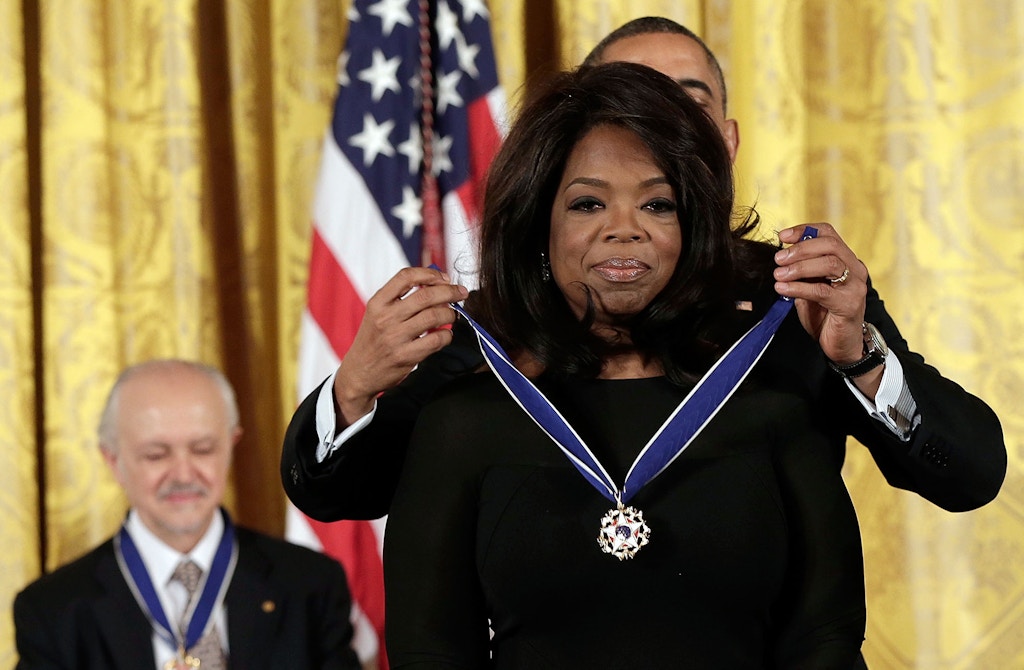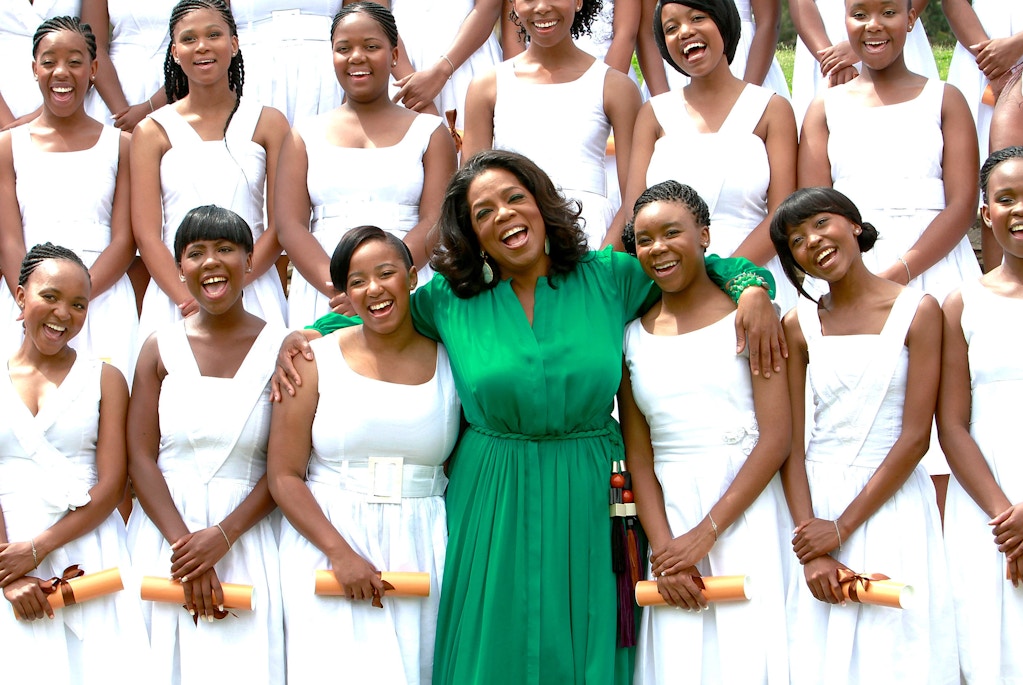Op
de Intercept publiceerde Mehdi Hasan afgelopen maandag een artikel
waarin hij zich al in de kop afvraagt of we helemaal gek zijn geworden,
door nu Oprah Winfrey, u weet wel o.a. notoire belastingontduiker en
presentator van een praatprogramma, als toekomstig president van te VS te zien......
Hasan
vergelijkt een aantal presidenten en stelt dan dat Winfrey, die o.a.
wel stabiel is i.t.t. Trump, een grote verademing zou zijn op Trump
al leg je daarmee de lat wel erg laag...... Bovendien is ze geen
seksist, of een fascist en wordt ze niet verdacht van het heulen met
'de vijand', zoals in het geval van Trump en Rusland...... Dat
laatste had Hasan niet moeten zeggen, hij zou moeten weten dat dit
gelul is van de democraten in samenwerking met een paar geheime diensten....... Het was zeker na de val van de Sovjet-Unie
bijna gebruikelijk voor de komende administratie, als met Israël ook
te overleggen met Rusland; dit had Hasan kunnen weten.
Voorts
stelt Hasan dat we (in de VS. Ap) niet nog een president nodig hebben
die een niet gekozen generaal en Goldman Sachs een deel van het werk
laat doen........ Hasan moet toch weten dat Trump bepaald niet de
eerste president is, die ofwel het leger min of meer liet beslissen
wat te doen (waarna het werd gebracht als was het een plan van de
president) en de banken de vrije hand gaf....
Maakt
verder niet uit Hasan schreef een uiterst informatief stuk, waarin
hij filosofeert en uiteindelijk stelt dat de VS echt geen tweede
nitwit als Trump nodig heeft, een tweede steenrijke figuur, die deels
het eigenbelang zal laten prevaleren........
Lees
en oordeel zelf:
Oprah
Winfrey for President: Have We All Gone Bonkers?

Photo:
Paul Drinkwater/NBCUniversal/Getty Images
January
8, 2018
HAVE
WE ALL gone
bonkers?
On
Sunday evening, #Oprah2020 began
trending on social media after Oprah Winfrey delivered a rousing
speech against
misogyny and racism at the Golden Globe Awards. While Oprah has in
the past ruled
out running
for public office, her longtime partner Stedman Graham just told the
Los Angeles Times that “she
would absolutely do it,” and
CNN is reporting that Oprah is “actively
thinking” about
running for president.
Do
people honestly consider the talk-show-host-turned-media-mogul to be
a viable or appropriate candidate to run against fellow celebrity
billionaire Donald Trump in three years? “I have no idea if Oprah
would be a good candidate or president,” former Obama speechwriter
Jon Favreau wrote
on Twitter,
“but dismissing her out of hand because Trump is a celebrity seems
short-sighted.”
Really?
I’m old enough to remember when liberals gave a damn about
experience, qualifications, and judgement; when Democrats mocked the
idea of Trump — a former reality TV star and property developer
who struggled
to tell the difference between Hamas and Hezbollah —
running for the presidency.
On
the campaign trail, former President Barack Obama blasted Trump as
“uniquely
unqualified,”
lacking in “basic
knowledge”
and “woefully
unprepared”
to do the job of commander-in-chief. In stark contrast, he
argued,
there had “never been a man or a woman more qualified than Hillary
Clinton to serve as president of the United States of America.”

Clinton
called Trump “totally
unqualified,”
while an op-ed from the New York Times editorial board, headlined
“Why
Donald Trump Should Not Be President,”
pointed out that the GOP candidate “has no experience in national
security.” Three days after the election, Vox ran a
piece headlined,
“Donald Trump is the only U.S. president ever with no political or
military experience.”
Well,
dear liberals and Democrats, guess what? President Winfrey would be
the second such president. Is this really what most Americans want or
what the United States government needs? Another clueless celebrity
in possession of the nuclear codes? Another billionaire mogul
who doesn’t
like paying taxes in
charge of the economy? And how would it be anything other than sheer
hypocrisy for Democrats to offer an unqualified, inexperienced
presidential candidate to the American electorate in 2020, given all
that they said about Trump in 2016?
Granted,
Oprah isn’t a raging
narcissist or
a racist
bigot;
she doesn’t have ties to white nationalists, isn’t accused of
colluding with a foreign government, and hasn’t been caught on tape
admitting to sexual assault.
Oprah
would be a far superior, smarter, and more stable president than
Trump in every imaginable way. But that, of course, is a
low, low bar.
As
CNBC’s Christina Wilkie, in a rare dissent on Twitter, put
it:
“I love to watch Oprah saying inspirational things on television.
But also I love to watch people who have political experience being
elected to national office.”
What
about former Hollywood actor Ronald Reagan, some Oprah supporters
might say? The Gipper, however, was also a former two-term governor
from California. Obama, also accused of being a political lightweight
when he ran for president, was a sitting senator, former
constitutional law professor, and author of two acclaimed books on
politics and policy. Even the know-nothing George W. Bush had won two
gubernatorial elections in Texas before throwing his hat in the
presidential ring in 2000.
Prior
to Trump, the only presidents to never
have served in public office prior
to being elected to the White House were Zachary Taylor, Ulysses S.
Grant, and Dwight Eisenhower. The first won the Mexican-American War;
the second, the Civil War; and the third, the Second World War.
Does
Oprah have anything on her resume to compare with that? Is emoting
on TV and handing
out free cars —
even if it is, admittedly, part of building an impressive
multi-billion-dollar media empire from scratch — really an
acceptable substitute for political or military experience? Is that
how debased the political culture has become?

Photo: Michelly Rall/Getty Images
DO
I SOUND elitist?
Perhaps. But what’s wrong with wanting people with intellect,
experience, and qualifications to fill the most important jobs? As
Oprah’s fellow celebrity liberal Jon Stewart once
said:
“Not only do I want an elite president, I want someone who’s
embarrassingly superior to me, somebody who speaks 16 languages and
sleeps two hours a night hanging upside down in a chamber they
themselves designed.”
Well,
the Oprah fans might argue, she could surround herself with big
brains. But isn’t that the argument that Trump supporters make,
too? Do we really want another president deferring to unelected
generals and Goldman
Sachs?
And do we think a talk-show host who promoted the careers of
hucksters Dr.
Phil and Dr. Oz,
while also giving
a platform to
the anti-science lunacy of actresses Jenny McCarthy and Suzanne
Somers, is capable of constructing a Lincoln-esque “Team
of Rivals”?
A political and economic “Justice League?” Come. Off. It.
To
be clear: I am not saying that Oprah can’t, or won’t, be
president. Predictions are for fools, and Trump has proved that
anything is possible.
Oprah’s
supporters — rightly — might point to her strong record on
standing up to racism and misogyny, not to mention her inspirational
oratory and backstory. Her record
on Iraq is
better than Clinton’s; she once even hosted
a show on universal health care with
Michael Moore. It might also seem like an act of divine justice if
Trump, hero to white nationalists and neo-Nazis, was replaced by a
strong black woman.
Oprah’s
critics — also rightly — might point to her fronting
for global corporations and
her role as “one
of the world’s best neoliberal capitalist thinkers.”
They might ask: What is Oprah’s position on drone strikes in
Pakistan? On supporting the Saudi war in Yemen? On cap and trade?
Single-payer? Tax reform? Does she have a plan for Middle East peace?
Could a person who once seemed surprised that Indian people still
“eat
with their hands”
really defuse a nuclear crisis on the Indian subcontinent?
But
we have to go beyond the pros and cons of an Oprah presidency — I
can’t believe I just typed that line — and consider some broader
questions: How much damage is U.S. celebrity culture doing to U.S.
politics? Why don’t ideologies, or even ideas, seem to matter
anymore? Shouldn’t progressives be making the case for the virtues
of government and collective action and, therefore, the importance of
electing people of ability, experience, and expertise to high office?
Shouldn’t they be arguing that billionaire TV stars have no
business running for the most powerful job on planet Earth,
regardless of whether they are an orange man called Trump or a black
woman called Oprah?
Some
pundits have suggested that the Democrats can’t win without a
celebrity candidate like Oprah in 2020. “If you need to set a thief
to catch a thief,” neoconservative John Podhoretz wrote in a New
York Post op-ed in
September 2017 that was retweeted by
Oprah herself, “you need a star — a grand, outsized, fearless
star whom Trump can neither intimidate nor outshine — to catch a
star.”
This
simply isn’t true. In August 2017, Public
Policy Polling found
Trump trailed Joe Biden (by 15 points), Bernie Sanders (14 points),
Elizabeth Warren (7 points), Cory Booker (5 points), and Kamala
Harris (1 point) in potential 2020 match-ups. Last month, an NBC/Wall
Street Journal poll found
Trump would lose to a “Generic Democrat” in 2020 by a whopping 16
points.
If
five different senators plus a Generic Democrat can beat this
Republican president, then why the liberal excitement over a
talk-show host? And why draw the line at Oprah? What about Mark
Zuckerberg? Mark
Cuban? Dwayne
“The Rock” Johnson? Kanye?
Where, oh where, does it end?
The
liberal response to the rise of Trump cannot and should not be “let’s
find our own bigger, better version of The Donald.” As columnist
Emily Arrowood wrote in
May 2016: “That Trump is acutely unqualified would be true even if
he were Mr. Congeniality, a champion of the people with the
aspirations of Jimmy Stewart in ‘Mr. Smith Goes to Washington.’”
The
irony is that Oprah may, in fact, be Ms.
Congeniality. But she is still as “acutely unqualified” as Trump.
Let’s get a grip, folks.
Top photo: In this handout photo provided by NBCUniversal, Oprah Winfrey speaks onstage during the 75th Annual Golden Globe Awards at the Beverly Hilton Hotel on Jan. 7, 2018 in Beverly Hills, Calif.
